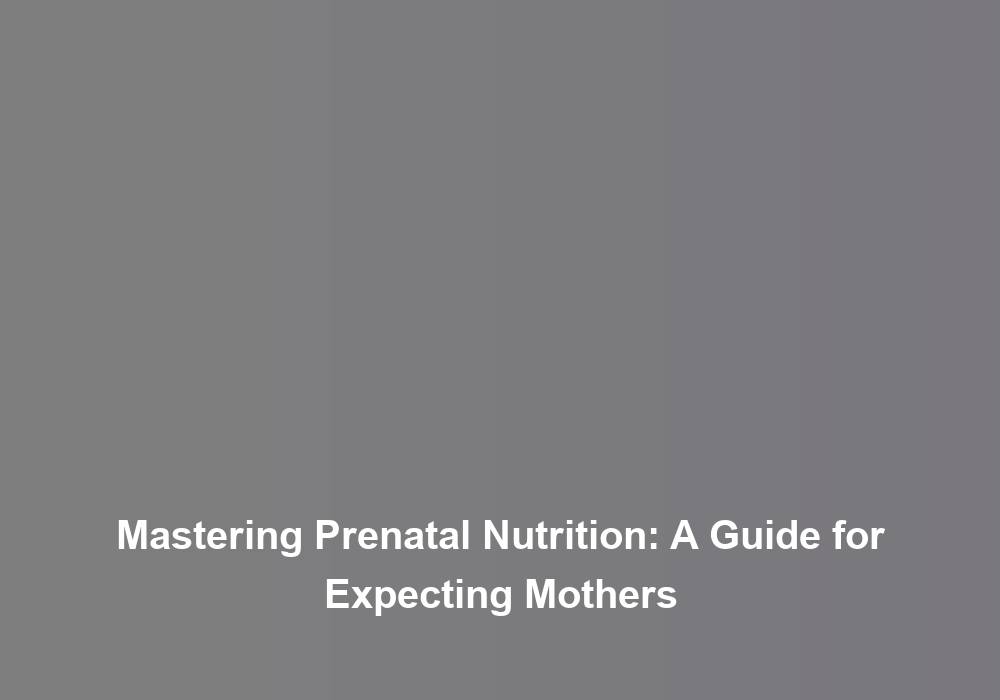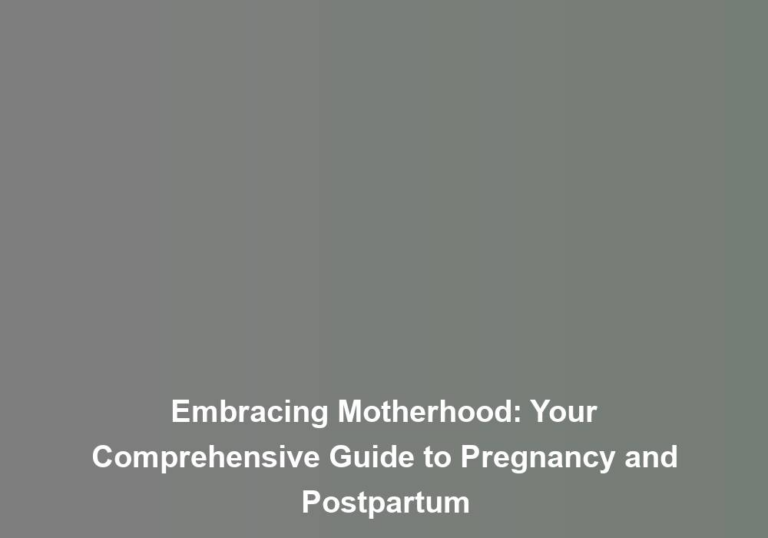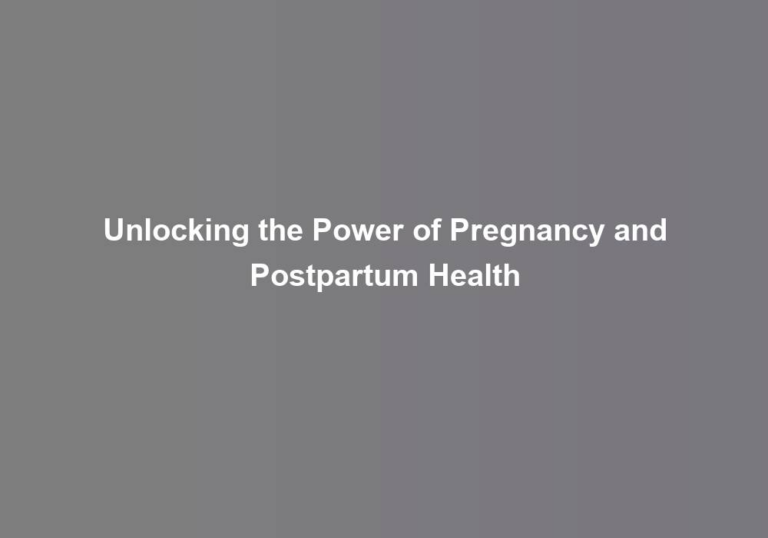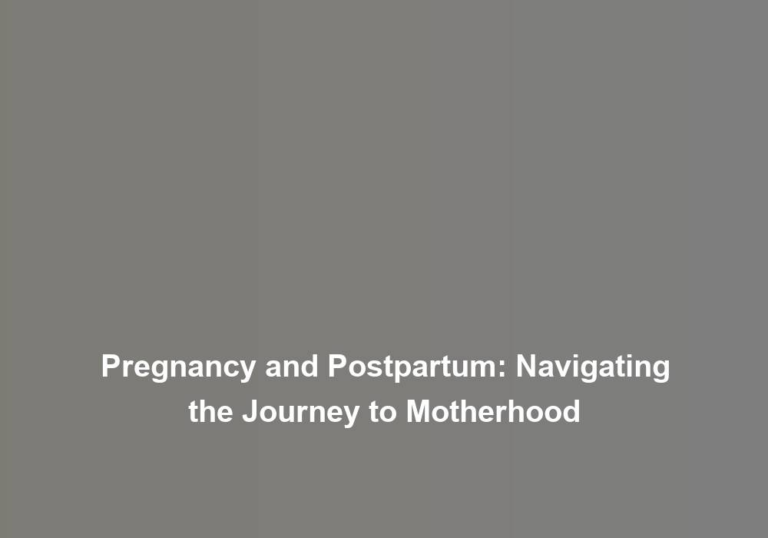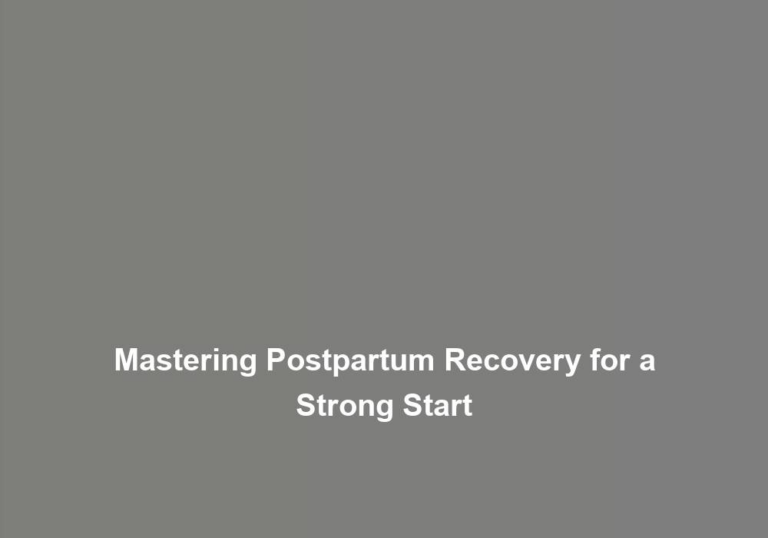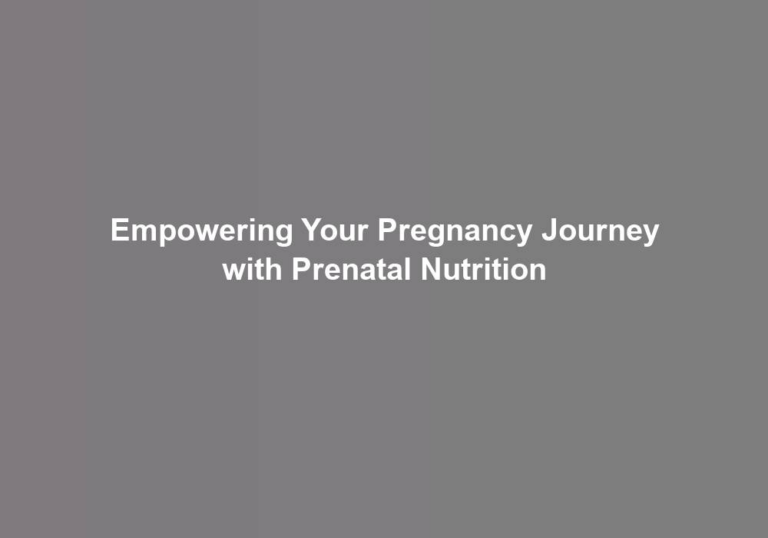Mastering Prenatal Nutrition: A Guide for Expecting Mothers
As an expecting mother, you may find yourself navigating a sea of conflicting advice when it comes to prenatal nutrition. With so much information available, it can be challenging to discern whatG??s truly beneficial for you and your baby. But fear not, because mastering prenatal nutrition doesnG??t have to be a daunting task. By understanding the specific nutritional needs for each trimester, addressing common concerns, and debunking prevalent myths, you can ensure that you and your baby receive the essential nutrients for a healthy pregnancy. But how exactly do you navigate the maze of prenatal nutrition? Stay tuned to discover practical tips and expert guidance that will empower you to make informed decisions for your and your babyG??s well-being.
Importance of Prenatal Nutrition
Ensuring adequate prenatal nutrition is crucial for supporting the healthy development of your baby and optimizing maternal health during pregnancy. Meal planning plays a significant role in meeting the nutritional needs of both you and your growing baby. It helps to ensure that you are consuming a well-balanced diet that includes essential nutrients such as folic acid, iron, calcium, and protein. Proper meal planning can also help in managing pregnancy-related symptoms like nausea and heartburn by identifying and avoiding trigger foods.
Weight management is another important aspect of prenatal nutrition. While it is normal to gain weight during pregnancy, excessive weight gain can lead to several health complications for both you and your baby. On the other hand, inadequate weight gain can also pose risks. Therefore, maintaining a healthy weight through proper nutrition and regular physical activity is essential. By working with your healthcare provider to establish a weight management plan, you can ensure that you are gaining the appropriate amount of weight based on your pre-pregnancy BMI.
Nutritional Needs During Each Trimester
During each trimester of your pregnancy, your nutritional needs will evolve to support the growth and development of your baby as well as your own health. ItG??s essential to be mindful of these changes and adjust your diet accordingly to ensure that you and your baby receive the necessary nutrients. HereG??s a breakdown of your nutritional needs during each trimester:
-
First Trimester:
-
Weight Gain: During the first trimester, weight gain is typically minimal, ranging from 1-4 pounds. Focus on consuming nutrient-dense foods to support your babyG??s early growth and development.
-
Dietary Restrictions: ItG??s crucial to avoid high-mercury fish, raw or undercooked meats, unpasteurized dairy products, and excessive caffeine. Additionally, consider taking prenatal vitamins to ensure adequate folic acid and iron intake.
-
Second Trimester:
-
Weight Gain: In the second trimester, weight gain will increase to around 1-2 pounds per week. This supports your babyG??s rapid growth. Focus on consuming a well-balanced diet that includes protein, healthy fats, and a variety of fruits and vegetables.
-
Dietary Restrictions: While some dietary restrictions may relax during this trimester, itG??s still important to avoid excessive sugar and processed foods. Continue to prioritize nutrient-dense foods and stay hydrated.
As you progress through each trimester, remember that your nutritional needs will continue to change. Consult with your healthcare provider to ensure that you are meeting the specific dietary requirements for each stage of your pregnancy.
Essential Nutrients for Mother and Baby
You need to prioritize essential nutrients during pregnancy to support both your health and the development of your baby. Folic acid is crucial for proper neural tube development, iron is essential for red blood cell production, and omega-3 fatty acids support brain growth and development. Ensuring you consume these nutrients in adequate amounts is vital for the well-being of both you and your baby.
Folic Acid for Development
Folic acid is a crucial nutrient for the development of both the mother and the baby during pregnancy. It plays a vital role in preventing neural tube defects in the baby. HereG??s what you need to know:
- Folate absorption
- Folate, the natural form of folic acid, is better absorbed from food sources such as leafy greens, citrus fruits, and fortified grains.
- Consuming a diet rich in folate is important, but it may not provide sufficient levels for pregnancy, making supplementation necessary.
Prenatal supplements – Prenatal supplements contain the synthetic form of folic acid, which is more easily absorbed by the body. – ItG??s recommended to start taking prenatal supplements before conception and continue throughout pregnancy to ensure adequate folic acid levels for the babyG??s development.
Iron for Blood Production
Iron is an essential nutrient for both the mother and the baby, supporting blood production and overall health during pregnancy. Adequate iron intake is crucial as it helps in the formation of hemoglobin, which carries oxygen to the cells in the body. During pregnancy, the bodyG??s blood volume increases to support the growing baby, making the need for iron even more significant. To enhance iron absorption, consider consuming vitamin C-rich foods, such as citrus fruits, alongside iron-rich meals. Vegetarian sources of iron include lentils, chickpeas, tofu, and fortified cereals. ItG??s important to note that the body absorbs iron from animal sources more efficiently than from plant-based sources, so vegetarian mothers may need to focus on incorporating a variety of iron-rich foods into their diet to meet their needs.
Omega-3 for Brain Growth
Supporting the development of your babyG??s brain, omega-3 fatty acids are essential nutrients for both you and your baby during pregnancy. Omega-3, specifically docosahexaenoic acid (DHA), plays a crucial role in the growth and development of your babyG??s brain and eyes. HereG??s why DHA supplementation is vital for cognitive development:
-
Brain Development: DHA is a key component of the brain, and during the third trimester, your babyG??s brain experiences rapid growth. Adequate DHA levels are essential to support this growth and optimize brain function.
-
Eye Development: DHA is also important for the development of the retina in the eyes, contributing to your babyG??s visual acuity.
Ensuring you consume sufficient omega-3 fatty acids, either through dietary sources or supplements, supports your babyG??s cognitive development and may have lasting benefits for their brain health.
Addressing Common Prenatal Nutrition Concerns
When planning your prenatal nutrition, itG??s important to address common concerns that may arise regarding your diet and overall well-being. Cravings for certain foods are normal during pregnancy, but itG??s essential to balance them with healthy choices. Opt for nutrient-dense snacks like fruits, yogurt, or nuts to satisfy cravings while meeting your bodyG??s increased nutritional needs. Incorporating healthy snacking into your daily routine can help stabilize blood sugar levels and prevent overeating.
Nutritional supplements play a crucial role in prenatal nutrition, especially in meeting the increased demand for certain vitamins and minerals. ItG??s important to discuss with your healthcare provider which supplements are necessary for you, as individual needs can vary. Prenatal vitamins are typically recommended to ensure an adequate intake of folic acid, iron, and other essential nutrients that support the healthy development of your baby.
Eating habits are a significant concern for many expecting mothers. ItG??s important to focus on consuming a variety of nutrient-rich foods, including lean proteins, whole grains, fruits, and vegetables. Additionally, staying hydrated is crucial for both your health and the development of your baby. Aim to drink plenty of water throughout the day and limit your intake of sugary or caffeinated beverages.
In addressing these common prenatal nutrition concerns, remember that every pregnancy is unique. Consulting with your healthcare provider and a registered dietitian can provide personalized guidance to ensure youG??re meeting your specific nutritional needs during this important time.
Debunking Prenatal Nutrition Myths
You may have heard the myth that you need to G??eat for twoG?? during pregnancy, but the truth is that you only need around 300 extra calories per day. Another common misconception is that you should indulge all your cravings, but itG??s important to maintain a balanced diet for your health and your babyG??s development. Additionally, while prenatal supplements can be beneficial, itG??s essential to remember that they are meant to complement a healthy diet, not replace it.
Myth: Eating for Two
During pregnancy, there is a common myth that you should be G??eating for two,G?? but this belief is not supported by current nutritional guidelines. ItG??s important to understand that your eating habits during pregnancy should prioritize quality over quantity. HereG??s what you need to know:
- Eating Habits
- Focus on nutrient-dense foods that provide essential vitamins and minerals for both you and your baby.
- Incorporate a variety of fruits, vegetables, lean proteins, whole grains, and dairy products into your diet.
Myth: Cravings Indulgence
Indulging in pregnancy cravings may seem harmless, but itG??s important to consider the nutritional implications for both you and your baby. While itG??s okay to satisfy cravings occasionally, managing them is crucial for maintaining a balanced prenatal diet. HereG??s a helpful guide to navigate through your cravings:
| Craving | Nutritional Alternatives | Craving Management Tips |
|---|---|---|
| Sweet | Fresh fruits, yogurt | Opt for natural sweetness and moderate portions |
| Salty | Nuts, seeds | Choose healthy, unsalted options |
| Spicy | Fresh salsa, hummus | Enjoy in moderation, avoiding excessive heat |
Myth: Supplements Necessity
Debunking the myth of supplement necessity in prenatal nutrition is essential for expecting mothers to make informed decisions about their dietary needs. While supplements can be beneficial in certain cases, they are not always necessary for every expecting mother. Here are some key points to consider:
-
Supplement Safety:
-
Consult with your healthcare provider before taking any supplements to ensure they are safe for you and your baby.
-
Be cautious of the quality and source of supplements to avoid potential harm.
-
Dietary Variety:
-
Aim to obtain essential nutrients from a well-balanced diet rich in fruits, vegetables, whole grains, lean proteins, and healthy fats.
-
Focus on incorporating a diverse range of foods to ensure you are meeting your nutritional needs without solely relying on supplements.
Practical Tips for Nourishing Pregnancy
To support a nourishing pregnancy, it is essential to focus on consuming a well-balanced diet rich in essential nutrients. Managing cravings and maintaining a balanced diet are crucial during pregnancy. ItG??s important to listen to your body and find healthy ways to satisfy cravings. Opt for nutrient-rich snacks like fruits, nuts, and yogurt to keep you energized throughout the day. Additionally, staying hydrated is vital for both you and your babyG??s health. Aim to drink at least 8-10 glasses of water daily and consider herbal teas or infused water for added variety.
| Managing Cravings | Balanced Diet | Hydration Tips |
|---|---|---|
| Listen to your bodyG??s signals and find healthy alternatives for cravings. | Include a variety of fruits, vegetables, lean proteins, whole grains, and healthy fats in your daily meals. | Drink at least 8-10 glasses of water daily and consider herbal teas or infused water for added variety. |
| Keep nutrient-rich snacks like fruits, nuts, and yogurt on hand for convenient, healthy options. | Avoid processed foods and sugary snacks, and opt for whole, nutrient-dense foods. | Monitor your urine color; pale yellow indicates proper hydration. |
| Choose snacks that provide a mix of protein, healthy fats, and carbohydrates to keep you satisfied. | Plan your meals ahead of time to ensure a well-balanced diet throughout the day. | Consume hydrating foods like watermelon, cucumbers, and celery. |
| Incorporate small, frequent meals to help manage hunger and stabilize blood sugar levels. | Use portion control and pay attention to your bodyG??s hunger and fullness cues. | Limit caffeine intake and opt for water, herbal teas, and fresh fruit juices. |
| Experiment with healthy substitutes for your cravings, such as frozen banana for ice cream or date and nut energy balls for a sweet treat. | Consult with a registered dietitian to develop a personalized meal plan that meets your specific nutrient needs. | Be mindful of your fluid intake during physical activity or in hot weather. |
Conclusion
In conclusion, mastering prenatal nutrition is crucial for the health of both mother and baby. Did you know that women who consume recommended levels of folic acid before and during pregnancy reduce their babyG??s risk of neural tube defects by up to 70%? By addressing your nutritional needs throughout each trimester and debunking common myths, you can ensure a healthy and nourishing pregnancy. Stay informed and prioritize your health and the health of your baby with proper prenatal nutrition.

